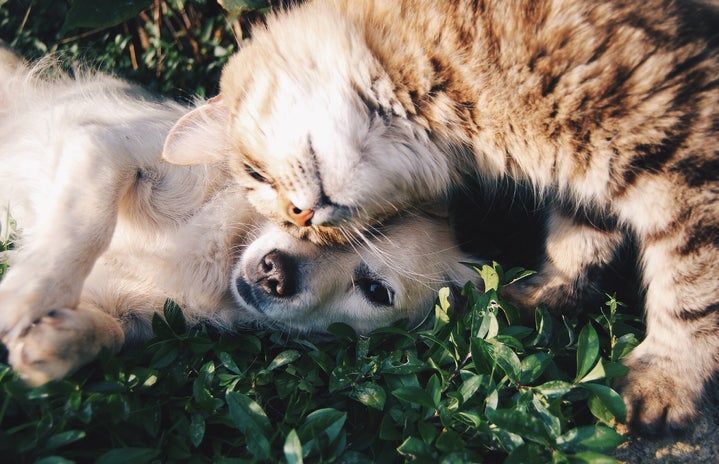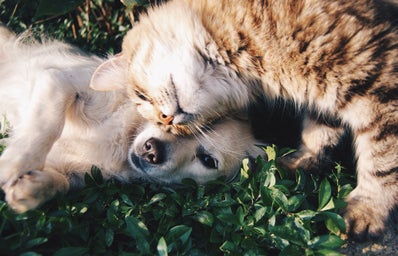On Monday, October 2nd, I lost my dog of 14 years, Blossom. For months my family had been preparing for the day she finally passed, as her wellbeing had deteriorated drastically within the past 2 years. She went from a spunky, playful pup to a watered-down version of that, as most old dogs do. Yet, despite knowing her time was coming, the moment I heard the news her 14 years suddenly felt so short. The dog who had been a huge part of my life from 1st grade to my sophomore year in college was leaving before I was ready to let her go. And due to distance, I didn’t get to say goodbye in person. Instead, my family and I bawled over Facetime. We watched my dog receive the shot that stopped her heart. And together, we watched her take her final breath.
I had cried for a couple of days straight after my dog died. I couldn’t even remotely pretend like I was fine. But after about a week, I decided enough was enough, labeled myself as ‘okay’, and resumed my usual activities. I did my best not to think about it, but the grief silently sucked the motivation out of me. Everything felt harder, and I fell farther behind in my work. As a self-diagnosed high achiever, any lack of success in schoolwork and personal endeavors makes me feel awful. I chalked my poor task completion rate up to procrastination and inadequacy, rather than the true culprit: losing the thing I loved most in this world.
I was angry and disappointed in myself about everything I was failing to do. I would lay awake at night, frustrated about my inability to even fall asleep. I was overwhelmed by every additional responsibility on top of that and couldn’t do as much as keep my room clean or go to class. I expected myself to keep up with the pace of everything else in life and everyone else I knew despite how obnoxiously grief was competing for my attention.
Someone recently mentioned to me their realization that the people passing by them had no clue that their problems existed. Their whole world could be crashing down, and an unfamiliar face could look into their eyes and not know a thing. This was something that frustrated me in my grieving process. I never wanted anyone to feel my pain, but it’s so hard to keep up with the world walking by you. I wanted someone to slow down with me and tell me it was okay that I was behind. That it was hard to miss something as much as I missed my dog. I wanted people to know I wasn’t okay, to see it in my eyes, in each step I took, despite the fact I couldn’t even admit it to myself at first.
How could there be any time to grieve when life demands so much of us? I’m sure many of you. have struggled with your own degrees of grief and may relate to my hesitance to lean into it. Whether it be the loss of a family member, a partner, or maybe a pet of your own, feeling the pain of that is incredibly difficult. It swallows you whole. It reminds you of how little you can control. That no matter how tightly you hold onto something, its presence is never permanent. I came across quote recently by novelist David Foster Wallace that I feel perfectly encapsulates loss. He said that “Everything I’ve ever let go of has claw marks on it”. Whether the thing you’re letting go of is an opportunity, a person you loved, or something torn from you by the kiss of death, the claw marks signify how deeply you cared for it. To look at how you loved something or someone so wholly is evidence that grief may not be a trap, but a mirror.
In the case of my dog. I had difficulty accepting that she was no longer around. Blossom was a constant thing in my life, something I always came home to. Over the years, she and I watched each other grow up. I remember the day we rescued her. The days it snowed so much that her little puppy legs sunk straight into it. The times she got so excited she ran in circles around the house. The way she hated being bathed and hated when we’d blow on her ears. How she’d let me hug her and annoy her to my heart’s content. It was hard to think about how she’s gone and there were no more memories to be made. But it was also hard to look back at my grief and see it as evidence of all the love I had for her. It’s silly to say, but in hindsight, I had trouble admitting that I loved my dog so much. I knew I did, but the more I realized it, the more I grieved her death. And grief was a pain I was trying to avoid.
But still, what do you do with those overwhelming emotions associated with loss? How do you carry the weight of grief on top of every other thing on your plate? To that, I have this analogy. Think about school pictures. You put in the extra effort to look a little nicer, or maybe you don’t, but your goal is for that picture to turn out good. Maybe for yourself, maybe because your parents insist on hanging it in the foyer, or maybe because the school is going to paste it in the yearbook regardless of how hideous you think it is. For that reason, you have everything figured out: how you’re going to smile, tilt your head, adjust your hair, and so on.
The time comes when the photographer has you sit down on the chair and momentarily blinds you with the flash. They quickly usher you away, and you now have to wait a couple of weeks to see how it turned out. But the moment you get your picture back, you hate it. You did everything you planned to do, but there’s still something you dislike about it that ruins the whole thing for you. Pretty soon, you have to walk by that picture on the wall in your own house. You have to flip past it in the yearbook at the end of the school year. And there’s nothing you can do about it besides accept it.
Maybe there are other instances in life where you’ve gotten a bad picture of yourself, like at a wedding or a photo shoot with your friends. Maybe there’s a picture of an ex lingering somewhere on your phone. But despite how much you dislike how you look, or how hurtful it is to see the face of someone you used to know, you don’t want to delete it because of how valuable that memory is. Having that bad picture of yourself with the bride on her wedding day is better than having no picture at all. But the funny thing about pictures is that while the existence and emotion of someone are permanently captured in that moment, your feelings about it after the fact are not.
By that, I mean that most likely, in a couple of months, or years, your perception of that picture would be different. Looking back at your school photo after graduation may remind you that you hated it, but you’d focus less on the parts you disliked and more on the moment that picture was taken. Who you were then in comparison to now may be a development of yourself you now cherish, and the part you disliked may no longer phase you. Maybe a picture you see of your ex no longer dictates your mood for the day. While I’m not saying that you should keep photos of your ex on your phone just for kicks, I am saying that at some point, you’ll grow in your appreciation and perspective of things that are currently weighing on you. Letting that picture you dislike now exist on your phone instead of deleting it will desensitize you after some time. And it’s the same concept with loss and grief.
You may not get to hold onto the existence of something you once had or loved, but you also don’t need to rid yourself of the emotions attached to it. As that picture would sit in your camera roll or your living room, those emotions need to sit in you. You have to let yourself see them. feel them, and overcome them. To completely be okay with something that hurts you comes with time, but even then, there’s no need to invalidate those feelings if they still persist after a while. There is nothing wrong with still feeling strongly towards a person, pet, or picture, despite how long ago the pain was. But if those feelings still hold the power to inhibit your life, then that probably means you haven’t allowed yourself to sit with it.
To conclude, there is a purpose in letting yourself feel. There is no set timeline on how long you will and should feel anything, and you are doing yourself a disservice by trying to set one. Never do anything with the intention of shutting away grief, because it will always find ways to demand your attention. Instead of silencing the sadness, let it wash over you like water. You’ll feel like you’re drowning for a while, but soon the sea starts to calm itself. Let the water fill your lungs and drain from your eyes. Let it flow within your body and mind. Let it make you stronger. And eventually, you’ll find yourself floating to the surface, where the grief is no longer heavy enough to pull you under.


